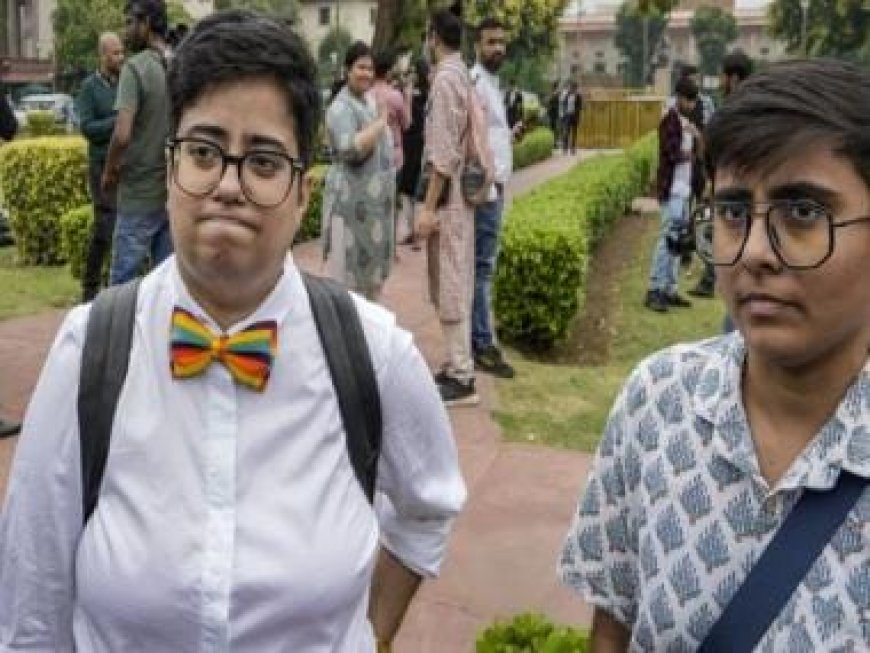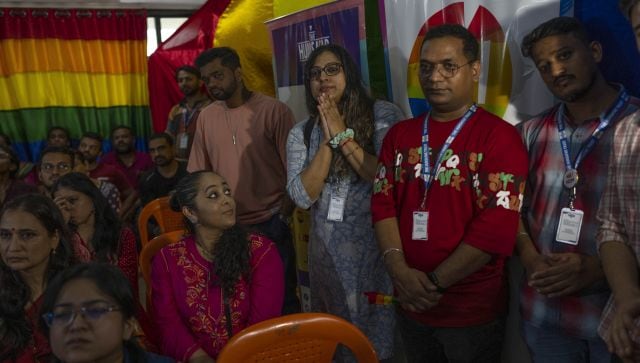Supreme Court says no to same-sex marriage or civil unions: How are they different?
Supreme Court says no to same-sex marriage or civil unions: How are they different?

Marriage equality in India remains elusive. In a big blow to the country’s homosexual community, the Supreme Court on Tuesday ruled against legalising same-sex marriage. The verdict was pronounced by a five-judge bench headed by Chief Justice of India DY Chandrachud. It comprised Justices Sanjay Kishan Kaul, Ravindra Bhat, Hima Kohli and PS Narasimha.
The bench also ruled in a 3:2 verdict against civil unions for non-heterosexual couples. While all five judges agreed that there is no fundamental right to marry, the Chief Justice and Justice Kaul spoke in favour of civil unions for homosexual and queer partners.
Also read: Why the Supreme Court did not legalise same-sex marriage in India
What is a civil union? How is it different from marriage?
A “civil union” is a legal status that bestows upon same-sex couples some rights and responsibilities which are allowed to heterosexual married men and women.
Civil union gives couples employment, inheritance, property and parental rights. However, there are some differences between a marriage and a civil union.
In the United States, same-sex marriages were legalised only in 2015. Before that, most American states allowed same-sex couples to marry under civil union laws. But this did not provide them with formal recognition of marriage.
Civil unions were recognised only by individual states and not by the federal law in the US. Hence, while a union was recognised in one state it was not in another if it did not have similar laws. Hence couples could not enjoy the benefits of being in a civil union across the US, according to a report in The Indian Express.
After the legalisation of same-sex marriages, several civil unions were converted into marriages.

What did the Supreme Court say about civil unions?
During the hearings in the apex court earlier this year, the Centre contested the maintainability of the petitions and also the judiciary’s right to confer legal recognition on the “socio-legal institution” of marriage. Then the CJI clarified that the hearing’s scope would be limited to developing a notion of a “civil union” that finds legal recognition under the Special Marriage Act.
In Tuesday’s verdict, while CJI and Justice Kaul were in favour of civil unions, the other three judges, Justices Ravindra Bhat, Hima Kohli and PS Narasimha were not.
In his judgement, the CJI held that queer couples have a right to seek recognition of their union. He said that the freedom of queer community to enter into unions is guaranteed under the Constitution.
Also read: Same-sex marriage verdict: Can unmarried partners, gay couples now adopt in India?
Justice Kaul said the legal recognition of civil unions for non-heterosexual couples represents a step towards marriage equality. He observed that queer unions “are to be recognised as a union to give partnership and love”, and held that the Special Marriage Act was violative of Article 14 for being discriminatory. However, similar to the view taken by the CJI, Justice Kaul too held that there were limitations on the court in including queer unions in the Special Marriage Act as the same was for the Parliament to decide, according to a report on LiveLaw.

However, a majority opinion did not recognise civil unions. Justice Bhat differed on the judgement of the CJI and stated that an entitlement to civil union could only be through enacted law. He held, “All queer persons have the right to choose their partners but State cannot be obligated to recognise the bouquet of rights flowing from such a Union.”
“Queer persons are not prohibited in celebrating their love for each other, but have no right to claim recognition of such union,” he said. Justice Kohli concurred with Justice Bhat.
Justice PS Narasimha, agreeing with Justice Bhat, stated that there existed no unqualified right to marry and that the right to marriage was a statutory right or flowing from a custom. He further held that it would not be constitutionally permissible to recognise a right to civil union mirroring a marriage, according to LiveLaw.

What did the petitioners say?
Advocate Karuna Nundy, who argued in favour of same-sex marriages, shared her views on the judgement and said that there were some opportunities that she believes the Supreme Court pushed off to legislators and the central government.
“The central government has made their stand clear with regards to marriage, we hope that their committee will ensure that civil unions are recognised and concomitants of marriage are then brought into law at least with regards to civil unions,” Nundy told the news agency ANI.
#WATCH | Supreme Court refuses to give marriage equality rights to the LGBTQIA+ community in India
Lawyer Karuna Nundy says, “…There were some opportunities today that I believe has been pushed off to the legislators and the central govt has made their stand clear with regards… pic.twitter.com/BerEKzHmCY
— ANI (@ANI) October 17, 2023
What is the Centre’s committee?
During hearings in the case, the Centre had submitted that it would set up a committee headed by the Cabinet secretary to look into practical difficulties faced by same-sex couples. These include getting rights to Provident Fund, and pension benefits among others.
The Supreme Court took note of the Centre’s submission and asked it to proceed with the formation of this panel.

Which countries allow civil unions?
Civil union is seen as an important step toward recognising same-sex relationships. In 1989, Denmark became the first country in the world to grant legal rights to same-sex couples by introducing registered partnership legislation. It replaced the law with marriage equality legislation.
Today, at least 12 nations allow civil unions or registered partnerships for homosexual couples. Croatia, the Czech Republic, Greece, Hungary, Italy, Slovenia, and Estonia have such laws.
Austria, Sweden, Norway, Brazil and Chile are among the nations that first recognised the right of same-sex couples to enter into civil unions before recognising their legal right to marriage.
With inputs from agencies
What's Your Reaction?


























































